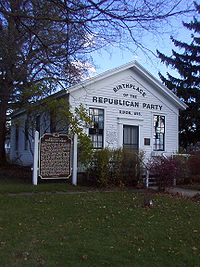
Back Portail:Conservatisme French Portal:Konservatisme NB Portal:Conservadorismo Portuguese Portal:Konservatism Swedish
| Main page | Showcase | Project |
Introduction
Conservatism is a cultural, social, and political philosophy and ideology, which seeks to promote and preserve traditional institutions, customs, and values. The central tenets of conservatism may vary in relation to the culture and civilization in which it appears. In Western culture, depending on the particular nation, conservatives seek to promote a range of institutions, such as the nuclear family, organized religion, the military, the nation-state, property rights, rule of law, aristocracy, and monarchy. Conservatives tend to favour institutions and practices that enhance social order and historical continuity.
Edmund Burke, an 18th-century Anglo-Irish statesman who opposed the French Revolution but supported the American Revolution, is credited as one of the forefathers of conservative thought in the 1790s along with Savoyard statesman Joseph de Maistre. The first established use of the term in a political context originated in 1818 with François-René de Chateaubriand during the period of Bourbon Restoration that sought to roll back the policies of the French Revolution and establish social order.
Conservatism has varied considerably as it has adapted itself to existing traditions and national cultures. Thus, conservatives from different parts of the world, each upholding their respective traditions, may disagree on a wide range of issues. Historically associated with right-wing politics, the term has been used to describe a wide range of views. Conservatism may be either libertarian or authoritarian, populist or elitist, progressive or reactionary, moderate or extreme. (Full article...)
Selected article
In the 1980s, under the Reagan Doctrine, the United States increased diplomatic, military, and economic pressures on the Soviet Union, at a time when the nation was already suffering economic stagnation. In the late 1980s, Soviet President Mikhail Gorbachev introduced the liberalizing reforms of perestroika ("reconstruction", "reorganization", 1987) and glasnost ("openness", ca. 1985). The Cold War ended after the Soviet Union collapsed in 1991, leaving the United States as the dominant military power. Russia rejected Communism and was no longer regarded as a threat by the U.S. The Cold War and its events have had a significant impact on the world today, and it is often referred to in popular culture, especially films and novels about spies.
Selected quote
Reversing Britain’s economic decline was such a huge and painful undertaking that, at least until the later years, the economy had to come first.
In fact, though flawed in some respects, the speech with its emphasis on remoralising society and on strengthening the family, deserves re-reading.
It does not though, reveal much about his essential philosophy, which with Keith — as with most professional politicians — remained below the surface.
The kind of Conservatism which he and I — though coming from very different backgrounds — favoured would be best described as "liberal", in the old-fashioned sense. And I mean the liberalism of Mr Gladstone not of the latter day collectivists.
That is to say, we placed far greater confidence in individuals, families, businesses and neighbourhoods than in the State.
— Margaret Thatcher, Keith Joseph Memorial Lecture ("Liberty and Limited Government"), 11 January 1996
Selected image
In the United States, the Republican Party emerged in 1854, growing out of a coalition of anti-slavery Whigs and Free Soil Democrats who mobilized in opposition to Stephen A. Douglas's January 1854 introduction of the Kansas–Nebraska Act into Congress, a bill which repealed the 1820 Missouri Compromise prohibition on slavery in territory north of the 36° 30′ latitude line, and so was denounced as an aggressive expansionist pro-slavery maneuver by free soil and anti-slavery Northerners.
Two small cities of the Yankee diaspora, Ripon, Wisconsin and Jackson, Michigan, claim to be the birthplace of the Republican Party (in other words, meetings held there were some of the first 1854 anti-Nebraska assemblies to call themselves "Republican"). Ripon held the first county convention on March 20, 1854. Jackson held the first statewide convention on July 6, 1854; it declared their new party opposed to the expansion of slavery into new territories and selected a state-wide slate of candidates.
Credit: Lecter
Did you know...
- ...that the Ronald Reagan Trail is a collection of highways in central Illinois that connect villages and cities that were of importance to Ronald Reagan?
- ... that in 1952, after giving the Checkers speech, Richard Nixon dictated a telegram resigning as Dwight D. Eisenhower's running mate, but his campaign manager Murray Chotiner ripped it up unsent?
- ... that Holby City woman is a voter demographic in the United Kingdom that was considered influential to the outcome of the 2010 United Kingdom general election?
Selected anniversaries in May
- 1979 – Margaret Thatcher becomes the first female Prime Minister of the United Kingdom.
- 1940 – the Norway Debate in the British House of Commons begins, and leads to the replacement of Prime Minister Neville Chamberlain with Winston Churchill three days later.
- 1988 – Section 28 is enacted in Great Britain with the effect of prohibiting the promotion of homosexuality by local authorities.
Topics
Associated Wikimedia
The following Wikimedia Foundation sister projects provide more on this subject:
-
Commons
Free media repository -
Wikibooks
Free textbooks and manuals -
Wikidata
Free knowledge base -
Wikinews
Free-content news -
Wikiquote
Collection of quotations -
Wikisource
Free-content library -
Wikiversity
Free learning tools -
Wiktionary
Dictionary and thesaurus
© MMXXIII Rich X Search. We shall prevail. All rights reserved. Rich X Search









